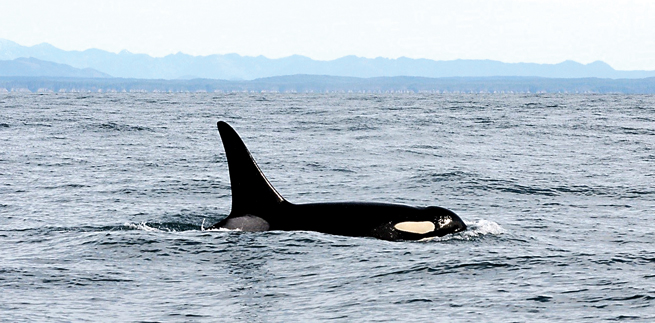By Phuong Le
The Associated Press
SEATTLE — Federal biologists have temporarily stopped tagging endangered orcas in the Puget Sound after a dead orca was found with pieces of a dart tag lodged in its dorsal fin.
Researchers use a dart projector to fire the small satellite-linked transmitters into the animals to track where they go in the winter and how they find food.
An initial exam of the 20-year-old orca found floating off Vancouver Island last month did not find a clear cause of death, but some advocates fear tagging injures the animals and say there are less invasive ways to monitor the small population of whales.
The transmitter is the size of a 9-volt battery and attaches to the orca’s fin with two titanium darts about 6 centimeters long. It’s designed to detach over time and leave nothing behind in the whale.
A necropsy of the dead orca found fragments remained in its dorsal fin when the tag fell off but “revealed no apparent localized or tracking inflammation,” Canada’s Department of Fisheries and Ocean said last week.
Though there were no signs of infection, veterinarians were investigating whether the tagging area might have provided a pathway for one, according to the National Oceanic and Atmospheric Administration (NOAA).
A final report is expected in several weeks.
NOAA researchers were assessing what went wrong with the transmitter and how to prevent it from happening again, said Brad Hanson, an agency wildlife biologist who leads the orca tagging program.
The researchers’ federal permit requires dart tagging to stop if the devices break, and tagging can’t resume until NOAA authorizes it.
Problems have forced a redesign of the device two previous times.
“Go back to the drawing board. Apply it less invasively,” said Kenneth Balcomb, senior scientist with the Center for Whale Research in Friday Harbor.
He called the devices “overly barbaric.”
“It’s injuring the animals, and they’re leaving pieces of hardware stuck in them that festers and causes tissue damage,” he said.
Hanson defended the program but said he understood the concerns.
“It’s provided us with a tremendous amount of information in a relatively short amount of time,” he said.
“I personally am concerned for the whales, but we’re also charged with providing the best available science for our colleagues to make management decisions.”
Southern resident orcas — which live in waters off southern British Columbia and the coast of Washington state, including near Port Townsend — are listed as endangered in the U.S. and Canada.
NOAA is considering whether to expand habitat protections for the orcas to include offshore areas from Washington to Northern California.
The male orca known as L95 was tagged in late February off Washington’s coast.
The whale appeared to be in good health, and researchers said they did not observe any breaking when firing the transmitter.
The device provided data for four days before the signal was lost.
Several weeks later, the animal was found dead.
Researchers worked with tag manufacturers to redesign the device in 2013 after it separated and left a piece of dart in another endangered orca.
There also were previous problems when the tag was used on four transient orcas.
“We have detected issues, and we tried to make the changes,” Hanson said.
NOAA noted that the tag has been used 533 times on whales and other marine mammals, and parts of the dart remained in the animals in only 1 percent of the cases.
Of eight Puget Sound orcas that have been tagged, two have had problems, Hanson said.
The others have had minor issues, such as scarring similar to what they would encounter naturally.
Several advocates say they understand the value of the data being collected but that the federal government has enough information to protect the animals.
“Right now, the federal agency has robust science about where the killer whales travel, and there are already good tagging studies to identify habitat that needs protection,” said Miyoko Sakashita with the Center for Biological Diversity.

